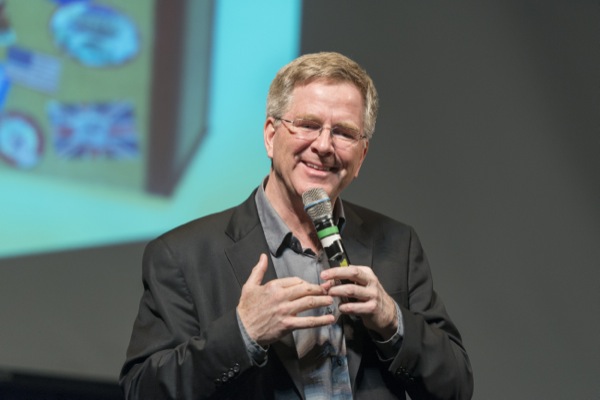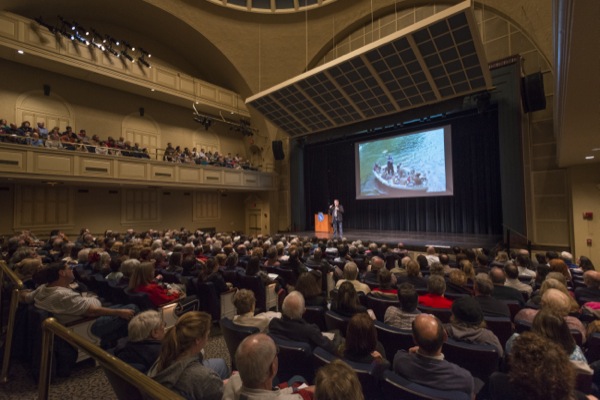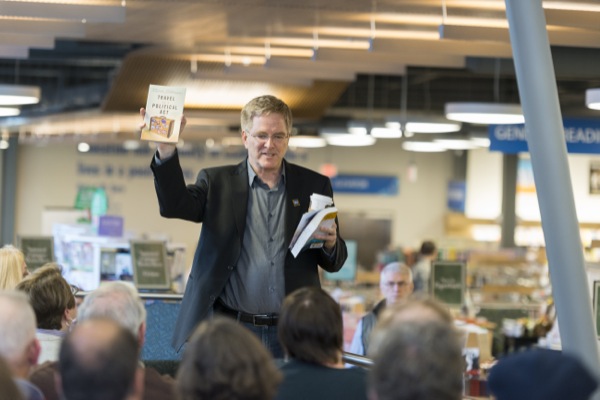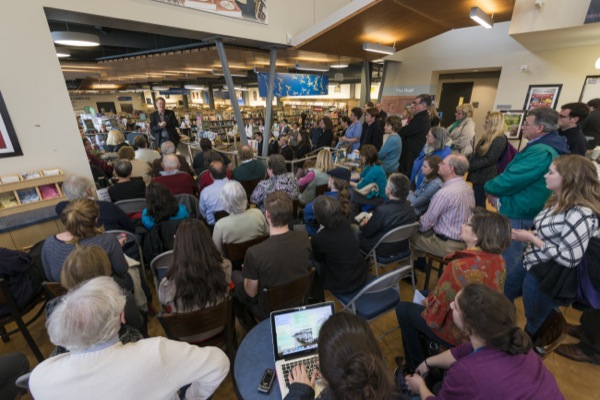Smart travels
Steves urges audience to promote peace, understanding through travel
5:29 p.m., March 13, 2013--Rick Steves, host of the popular public television series Rick Steves’ Europe, spoke in Mitchell Hall on Monday, March 11, as a part of the University of Delaware Institute for Global Studies’ 90th anniversary celebration of the study abroad program.
Steves shared anecdotes accumulated from more than 30 years of traveling Europe and expressed his belief that traveling is a transformative experience.
People Stories
'Resilience Engineering'
Reviresco June run
“We come home with a broader perspective and we come home and realize how blessed we are here,” he said.
Once a reluctant teenager being dragged around Europe with his parents, Steves is now a seasoned travel authority who spends over one-third of the year in Europe.
Steves has shared his travel knowledge as a tour guide, an author, in guidebooks, on public television and radio – even via a free phone app featuring self-guided tours.
“As a travel teacher, my responsibility is to bring home the magic,” he said.
Thoughtful travel
Steves discussed the difference between hedonism and travel; the difference between lying on the beach with a cocktail and traveling to promote peace and understanding.
“I want to travel in a way that brings us together,” he said.
His book, Travel as a Political Act, explores the importance of experiencing cultural differences and using travel as a tool to create harmony in the ever-shrinking world.
“Everybody doesn’t have the American dream, other people hold different truths to be self-evident,” he said.
Steves recounted some of his most profound travel tales for the audience. After the Cold War, he stood surrounded by teary-eyed Germans during the re-opening of a bombed parliament building in Berlin.
In France, locals brought out an old American flag with 48 stars to express their gratitude for American assistance during World War II – decades after the war ended.
Steves talked of government-approved machines dispensing clean syringes on the street, trains moving 200 miles per hour, wine-filling stations reminiscent of gas stations, and high school pep rallies for the separation of mosque and state.
Traveling misconceptions
Many Americans don’t travel for fear of terrorism or anti-American sentiments, said Steves.
“Twelve million Americans go to Europe a year, 12 million come back,” he said, remarking that more people die on the streets in America than they do traveling.
“So if you care about your loved ones, you will take them to Europe tomorrow,” he joked.
Although Steves is an expert on Europe, he has traveled all over the globe.
He described an enlightening trip to Iran, a country oft misunderstood by Americans. Arriving in Tehran as an American, Steves expected to encounter hostility. He was pleasantly surprised.
“I’ve never been received so warmly in all my travels,” he said of his time there.
Sitting in an Iranian taxi stuck in unbearable traffic, Steves received an unexpected sign of friendship. Someone in a nearby taxi requested that the cab driver roll down his window. The Iranian handed Steves a bouquet of flowers to apologize for the city’s traffic.
“I’ve never had to hide the fact that I’m American,” said Steves.
Of course, there are some negative opinions associated with America, but Steves said the negative views have more to do with American military procedure and trade policy than with the American people themselves. These trade policies can be particularly harsh on Third World countries.
In the United Nations, the U.S. is routinely among the extreme minority of countries voting against resolutions concerning Third World issues, according to Steves.
“That’s not good for the brand of America,” he said.
Understanding differences
Steves discussed the importance of learning about different regional cultures, beliefs and customs.
“The English don’t drive on the wrong side of the road,” he said. “They drive on a different side of the road.”
For example, Steves discussed how the American government tends to legislate moral issues, such as drugs and prostitution, while other countries tend to look at them as public health matters.
Steves discussed how his travels showed him that every country faces tribulations that impact the way its citizens live.
“I’m fascinated with the baggage people live with,” he said. “It’s important for us to at least recognize where they are coming from.”
“If everybody traveled, the world would be a much safer place, I think.”
Article by Kelley Bregenzer
Photos by Evan Krape














